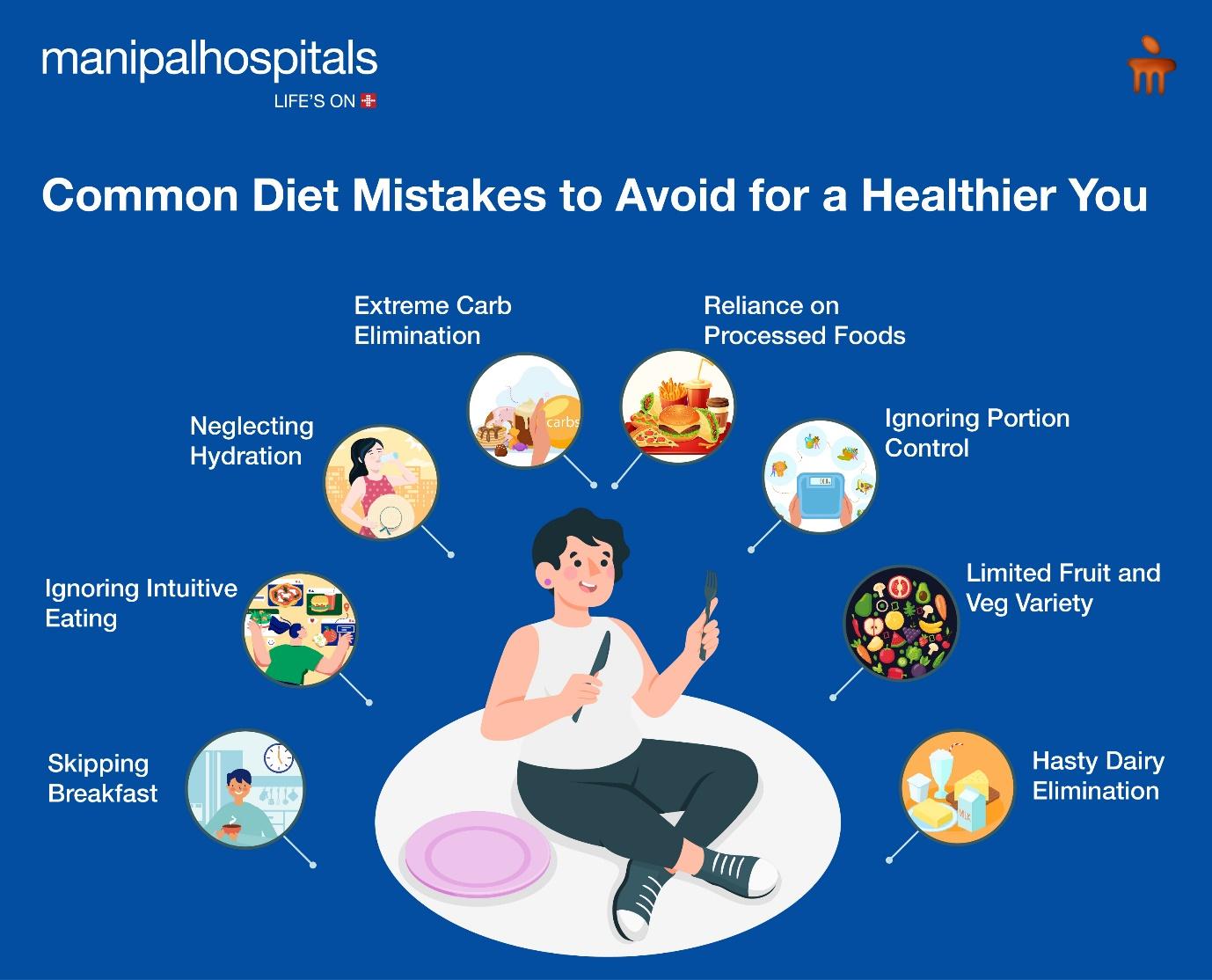
Everyone wants to maintain a healthy diet to stay fit. Thus, in the pursuit of a healthy lifestyle, we frequently come across a plethora of diet trends and fads that promise immediate results. However, unknowingly, we may be making some common diet mistakes that could have adverse effects on our overall health.
Therefore, we will venture beyond the ordinary and explore some unique and lesser-known diet truths in this article that can positively impact overall health. Let's unravel these unconventional secrets and pave the way to a more nourished and vibrant life.
1. Embrace Intuitive Eating
In a world of fad diets and strict diet planning, we usually fail to pay attention to the needs of our bodies. Through intuitive eating, our natural hunger and satiety markers can be re-established. Instead of strictly following dietary guidelines, concentrate on mindful eating, savouring each bite, and stopping when you feel comfortably full. This method helps you have a better relationship with food, improves digestion, and makes it possible for you to truly enjoy meals. Consult a top hospital if you want to avoid weight loss mistakes and follow the best diet.
2. Skipping Breakfast
Skipping breakfast has become a routine for many individuals, especially those leading a busy Skipping breakfast has become a routine for many individuals, especially those leading a busy lifestyle. However, breakfast is often referred to as the most important meal of the day for good reason. It kickstarts your metabolism and provides essential nutrients, which not only fuel your body but also improve cognitive function and overall mood. Therefore, skipping breakfast, not only backfires on your overall health but can also be a reason for the illness or disruption of the organs. It is one of the major weight loss mistakes that people make when they are trying to lose weight.
3. Ignoring Hydration
Your energy levels, digestion, and even the condition of your skin can all be adversely affected by dehydration. Many people fail to consume enough water during the day or choose to substitute sugary beverages instead, which just makes the problem worse. Keep a water bottle on you at all times, and set alarms to remind you to drink enough water.
4. Carb Elimination
The low-carb diet trend has gained immense popularity, leading many to believe that cutting out carbohydrates is a shortcut to weight loss. However, carbohydrates are a primary source of energy for the body and brain. Instead of eliminating them, opt for complex carbohydrates such as whole grains, fruits, and vegetables.

5. Relying on Processed Foods
The convenience of processed foods has trapped many of us into an unhealthy eating pattern. These foods are often high in salt, sugar, and unhealthy fats while lacking essential nutrients. Opt for fresh, whole foods whenever possible and be mindful of labels when buying packaged products.
6. Overlooking Portion Control
Portion control is crucial for maintaining a healthy weight and preventing overeating. Many individuals tend to ignore portion sizes, leading to excessive calorie intake. Consider using smaller plates and measuring your food portions to avoid overindulgence.
7. Lack of Fruit and Vegetable Diversity
Eating a wide range of fruits and vegetables provides a plethora of vitamins, minerals, and antioxidants essential for optimal health. Sticking to the same few options may leave you deficient in certain nutrients. Aim to "eat the rainbow" by incorporating a variety of colourful fruits and vegetables into your meals.
8. Giving Up Dairy-product
Full-fat milk, cheese, and ice cream are often avoided by dieters, but giving up dairy products may not be the best option. Studies have shown that the body produces more fat when calcium levels are low and less fat when calcium levels are high. Dairy may also offer other benefits that calcium supplements do not, reducing their efficiency. Only consume low- or non-fat dairy products.
As we move away from traditional dieting practices, we discover a universe of unique and inspiring facts that can improve our connection with food and our overall health. Embrace intuitive eating, prioritise fermented and prebiotic-rich foods, and tailor your diet to your specific requirements. You're on a holistic nourishment path if you focus on mindful hydration, various plant-based proteins, and stress-relieving meals. It is recommended to seek advice from an expert for a better, happier, and more vibrant existence.
FAQs
1. How does dieting affect your overall health?
Our body begins to adapt to good dietary changes as soon as they are implemented. It can be beneficial because a diet can eventually reduce the risk of obesity, diabetes, and heart disease including our overall well-being. Whereas, a poor diet can impact negatively and lead to many chronic and fatal diseases.
2. What are the five possible consequences of a poor diet?
Studies and research have shown that diet has an enormous impact on our health and well-being. A balanced diet can help us to stay fit. On the other hand, a poor diet may have the following consequences-
-
High blood sugar
-
High cholesterol
-
Stroke and heart disease.
-
Weaken the immune system.
-
Overweight or obesity
3. What are the top five brain foods?
Some foods can boost your mood, sharpen your memory, and help your brain perform at optimal efficiency if you include them in your diet. They are:
-
Fatty Fish
-
Fruits and nuts
-
Leafy green vegetables
-
Avocado
-
Apple and Plums
4. Can we indulge in sugary treats occasionally?
Occasional indulgence is fine, but try to limit your intake of sugary treats and opt for healthier alternatives like fruits or dark chocolate in moderation.



















 5 Min Read
5 Min Read















